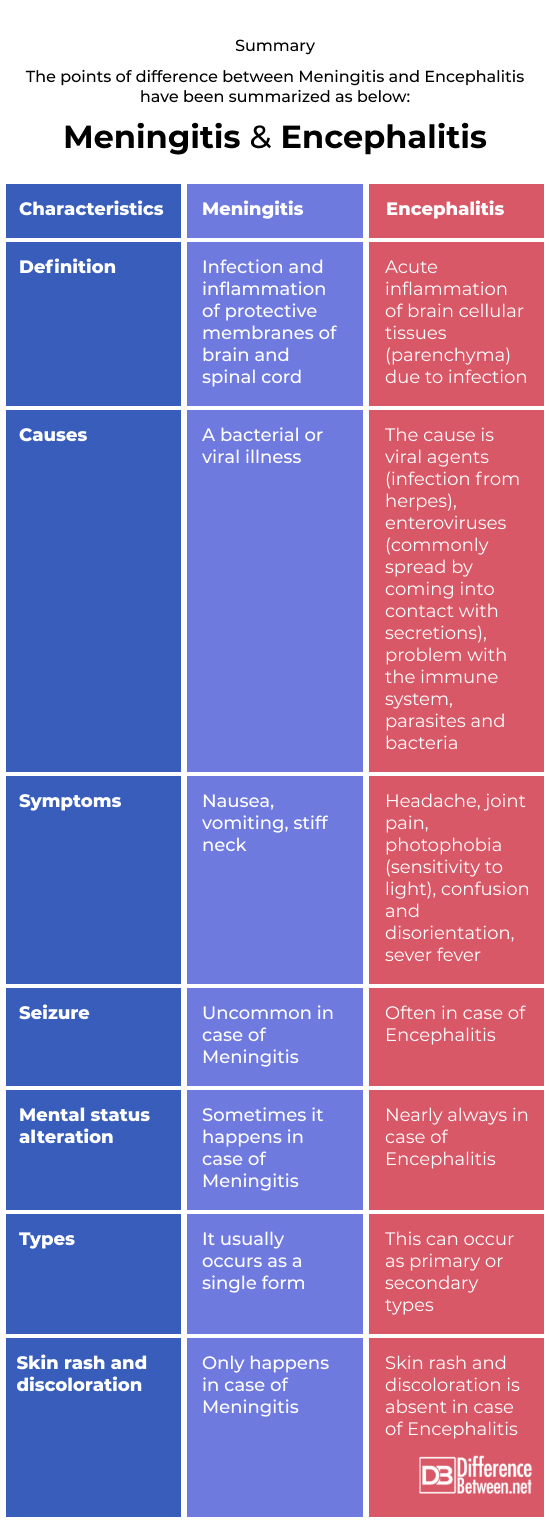Difference Between Meningitis and Encephalitis

Difference between Meningitis and Encephalitis
Both encephalitis and meningitis are severe illnesses caused due to viral or bacterial infection and result in the inflammation of the brain. The two conditions are however distinctly different. Meningeal infections, which affect the protective layers (cellular tissues) that encircle the brain and spinal cord, frequently result in meningitis. On the other side, encephalitis occurs due to the swelling (inflammation) of the entire brain. Both conditions can be brought on by a virus, bacterium, or other substances.

Similarity
Both are neurological disorders caused by infectious or non-infectious agents. In both the conditions, there is swelling and inflammation of the nervous system and the spinal cord involved. Viral agents is the cause in both the conditions.
Meningitis
The infection of the meninges (three layers of membranes that cover and protect your brain and spinal cord) is known as meningitis. It typically pertains to infections brought on by parasites, bacteria (Streptococcus pneumoniae), fungi (Cryptococcus, Histoplasma, Blastomyces) viruses (Herpesviruses), and other microorganisms.
Bacterial meningitis (life threatening and can result in death in hours) is the most prevalent type of meningitis. If not treated in time, it can cause death.
Encephalitis
Brain inflammation known as encephalitis can be brought on by a virus, bacteria, medicine, or immune system problem. A rare, frequently severe condition called encephalitis calls for prompt medical attention.
Difference between Meningitis and Encephalitis
Definition
Meningitis
Meningitis is an inflammation of the meninges (which protects the nervous system), the protective layer surrounding the brain and spinal cord. It is usually caused by bacterial, fungal and viral agents.
Encephalitis
Encephalitis is a rare but serious condition that causes inflammation of the brain itself. It is caused only by the viral agents.
Symptoms
Meningitis
- Headache
- Vomiting
- High temperature/fever
- Confusion
- Drowsiness
- Double vision
- Numbness in your face
- Stiff neck
- Upset stomach
- Skin rash and discoloration
- Lack of thirst
- Lack of concentration
Encephalitis
- Vomiting
- Incessant crying
- A bulge on the top center of the head termed as the fontanel
- Behavioral changes
- Dizziness
- Paralysis
- Hearing loss
- Unconsciousness
Diagnosis
Meningitis
Common tests to diagnose meningitis include:
- Blood cultures
- Spinal tap
- Imaging. Computerized tomography (CT) or magnetic resonance imaging (MRI)
Encephalitis
- A CT scan to look for alterations in the shape of the brain.
- An MRI to identify the distinctive brain changes that indicate the illness.
- An electroencephalogram (EEG) test – People with encephalitis may have sharp pulses in one or both of their temporal lobes on an EEG, which records the electrical activity of the brain.
Treatment
Meningitis
Medications – Antibiotics, Antiviral medication, steroids, Penicillin, ampicillin, and ceftriaxone.
Palliative care – Hospitalization and oxygen therapy
Over-the-counter pain medicines if you have a fever or aches
Encephalitis
You may need:
- Antibiotics
- For treating inflammation – acetaminophen (Tylenol, others), ibuprofen (Advil, Motrin IB)
- Anticonvulsants
- Surgery
- Immunoglobulin therapy
- Therapeutic plasma exchange:
- For treating viral infections (antiviral medications)
- For controlling seizures (antiseizure medicines)
- Breathing assistance (mechanical ventilation)
- Immunomodulators
- For maintaining your hydration status – Intravenous (IV) fluids
- Steroids
- Tube feeding
- A detailed rehabilitation
- A cognitive rehabilitation
Summary
The points of difference between Meningitis and Encephalitis have been summarized as below:

FAQ:
Which is more serious encephalitis or meningitis?
For otherwise healthy individuals, bacterial meningitis can be fatal or result in stroke, hearing loss, or damage to nervous system. Even though encephalitis is frequently mild, severe cases can result in acquired brain damage and other long-term side effects.
What is the difference between encephalitis and meningitis radiology?
Encephalitis is an infection of the entire brain tissue, whereas meningitis is an inflammation of the (protective membranes of the brain and the spiral cord) meninges.
What is the difference between meningitis encephalitis and brain abscess?
Meningitis can develop if pathogens penetrate these layers and cause an inflammatory reaction. The inflammatory reaction causes encephalitis if they manage to enter the brain parenchyma itself. And if a disease isolates itself, it is referred to as a brain abscess.
What is the difference between encephalitis and encephalopathy?
Terms like encephalopathy and encephalitis are commonly misused. Even though the sounds are identical, the conditions are different. In encephalitis, the brain itself swells or becomes swollen. Encephalopathy, on the other hand, refers to the cerebral condition that can develop as a result of different medical conditions.
How do you rule out meningitis from encephalitis?
Symptoms of meningitis differ from encephalitis. Meningitis symptoms include vomiting, sleepiness, photophobia, headache, stiff neck, blotchy rashes and symptoms of encephalitis include seizures, difficulty speaking, confusion, focal deficits.
What is the most common cause of encephalitis?
Encephalitis is caused by herpes simplex viruses type 1 and 2 (more commonly known as herpes) which is the main virus responsible for cold sores and the varicella zoster virus (also known as human herpesvirus 3 or Human alphaherpesvirus 3) and enteroviruses (a group of viruses that cause a variety of infections).
- Difference Between Global Warming and Greenhouse Effect - May 18, 2024
- Difference Between Vaccination and Immunization - March 3, 2024
- Difference Between Selective Mutism and Autism - February 25, 2024
Search DifferenceBetween.net :
Leave a Response
References :
[0]Feigin, R. D., MCCRACKEN JR, G. H., & Klein, J. O. (1992). Diagnosis and management of meningitis. The Pediatric infectious disease journal, 11(9), 785.
[1]Lyons, J. L. (2018). Viral meningitis and encephalitis. Continuum: Lifelong Learning in Neurology, 24(5), 1284-1297.
[2]Solomon, T. (2004). Flavivirus encephalitis. New England Journal of Medicine, 351(4), 370-378.
[3]Swanson, D. (2015). Meningitis. Pediatrics in review, 36(12), 514-526.
